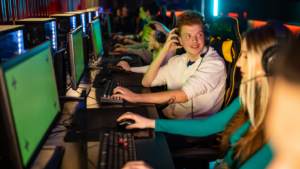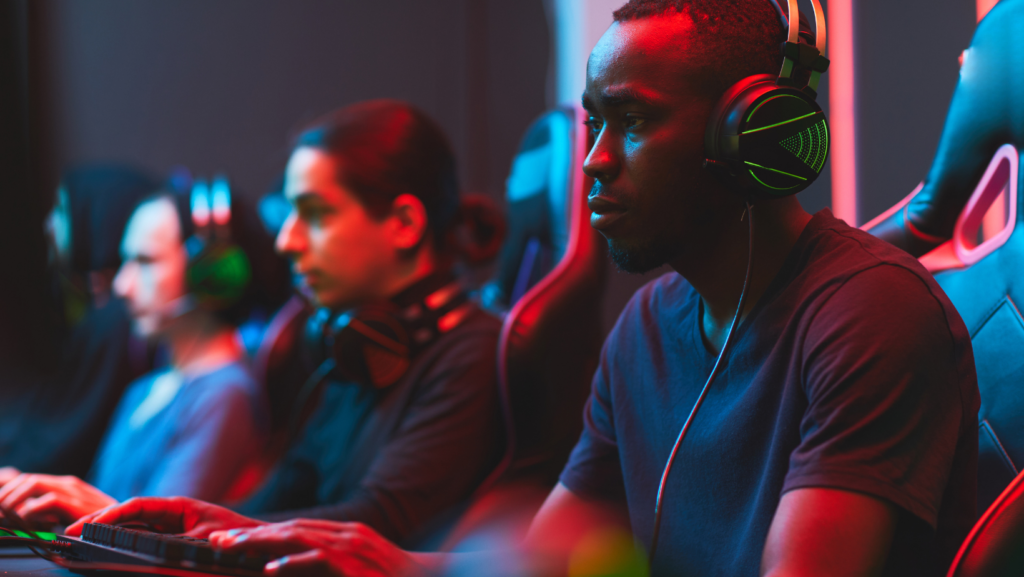The debate is heating up: is esports truly a sport? While traditionalists might scoff at the idea, there’s a compelling case to be made. Esports, or competitive video gaming, has surged in popularity, boasting a global fanbase and multimillion-dollar tournaments.
This article dives into why esports is a sport and deserves recognition as a legitimate sport. It’ll explore the discipline, strategy, and skill required in esports, paralleling these elements with those in traditional sports. So, whether you’re an esports enthusiast or a skeptic, get ready for a fresh take on this modern phenomenon.
Why Esports is a Sport
 Diving further into the debate, this section explores inherent similarities between esports and traditional sports. This will be accomplished by revisiting the definition of sports and evaluating why esports is a sport and the athleticism required in the esports domain.
Diving further into the debate, this section explores inherent similarities between esports and traditional sports. This will be accomplished by revisiting the definition of sports and evaluating why esports is a sport and the athleticism required in the esports domain.
By definition, a sport involves physical exertion and skill in which individuals or teams compete against each other for entertainment purposes. Esports aligns with this definition while embodying the requirements of mental agility and manual dexterity. Their players compete in a highly engaging and strategic environment, much like athletes in traditional sports. Esports players also require a comprehensive understanding of game mechanics. For instance, Dota 2 demands a deep understanding of more than 100 characters, each with unique abilities, to develop effective strategies. Moreover, esports tolerates fierce competition as demonstrated by grand tournaments, such as the League of Legends World Championship with 3.8 million peak viewers in 2020.
The Similarities Between Traditional Sports and Esports
Furthering the argument for esports’ sports status, the parallels between esports and traditional sports can’t be overlooked. Among these similarities are the team dynamics and strategies, and rigorous training and discipline.
Team Dynamics and Strategies
Much like traditional sports, team dynamics serve a vital role in esports. Evident in games like Dota 2 and League of Legends, teamwork plays a critical role in achieving victory. Distributing roles, like supporting or attacking, and making split-second decisions all necessitate harmonized teamwork and a deep understanding of the game strategy. This level of strategic planning is often compared to sports such as football or basketball, where coordination and communication among players can mean the difference between winning and losing.
Training and Discipline
The discipline level in esports equals that in traditional sports. Esports players undergo rigorous mental and physical training routines. Mental training includes activities like studying game mechanics, practicing strategies, and reviewing game footage, while physical training includes maintaining hand-eye coordination and reflexes, often compared to the fast reacting habits of tennis or baseball players. The significance of discipline parallels traditional athletes, where a strict regime of training schedules, balanced diets, sufficient rest, and constant performance evaluations are essential to maintain competitive edge.
The Recognition of Esports as a Sport
 Esports, characterized by its competitive nature and strict training regimen, parallels traditional sports. Its official recognition, explored here, adds credibility to the argument of it being a legitimate sport.
Esports, characterized by its competitive nature and strict training regimen, parallels traditional sports. Its official recognition, explored here, adds credibility to the argument of it being a legitimate sport.
Esports has infiltrated the fabric of both collegiate and professional sports. Universities such as Robert Morris University dish out scholarships for Esports, reflecting their commitment towards this booming industry. They’re not alone. Several other academic institutions have followed suit, integrating Esports into their athletic departments.
On the professional front, we see a resemblance to traditional sports structures. Esports teams, like Cloud9, compete in regional and international tournaments. These teams function similarly to professional sports entities.
The Olympics and Esports
The association between Esports and the Olympics is gradually strengthening. Many consider the inclusion of Esports as a demonstration event in the 2018 Asian Games as the start of this relationship. Further, in 2022, it’s scheduled as a medal event for the first time in the Asian Games. Indeed, this speaks volumes about the global recognition of why Esports is a sport. Although it’s yet to be a part of the Olympic Games, the International Olympic Committee has initiated constructive dialogues about Esports’ potential inclusion. Its eventual inclusion would solidify the positioning of Esports as a well-recognized sport internationally.

